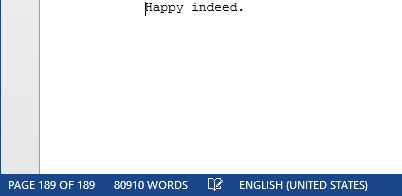Remember that novel I started in November? I finally finished it today!
The first 50,000 words were easy. Probably because I was on a deadline. November, I had my writing group, I was
motivated, and the writing sprints made it even easier.
Then December came along and all of the ‘life’ I put on hold
came back. Like cleaning the house and
doing laundry. And work got a little
chaotic as well.
But I did it. Three
weeks later than I was hoping, but I made it!
This is novel number 5 that I’ve written from beginning to end, and it’s
unique in several different ways. All of
my other novels are YA Fantasy with magic and romance. There’s none of that in this novel. It’s a modern day story of a woman whose dad
gets diagnosed with Alzheimer’s. I knew
it was going to be hard to write, and even knowing that, I’m still amazed by
the work and effort that it took to finish.
It’s a good idea to try something new every once in a
while. We all get into ruts, and unless
we push ourselves, we’ll never grow and learn.
So here’s what I learned from my newest novel, the Purple
WIP:
1. I can write adults. I’ve never had a main character over the age
of about 25. Jen is almost 40 with three
kids, and her oldest is 15. I know how
to think like a teenager because I’ve experienced it. Putting myself in the mindset of someone
older than me was foreign, though we figured each other out by the end.
2. It’s really tricky writing ambiguous
endings. My other novels had a clear cut
ending. They achieved their goals, they
overcame their obstacles, and they lived happily ever after. I’m a huge fan of HEA. But with Alzheimer’s, that’s not really an
option. One of the reasons that it took
me so long to finish was because I didn’t know where the story ended.
3. Writing in two languages is harder than it
looks. Jen is married to a Hispanic man,
and they are asked to help a Spanish Congregation of their church. She doesn’t speak Spanish, but there’s
constant Spanish around her. Trying to
write a conversation between her and some of the sisters in her congregation
was almost impossible, though probably very accurate.
4. It’s a lot harder to write real places. When I make up a setting, I can decide where
the cities are, what the weather’s like, and the history. Not so much with real life fiction. Though, I did learn how to spell Milwaukee,
so that’s a plus, right?
5. I enjoy writing YA Fantasy. I think this was the biggest thing I
learned. It was a great experience, and
I’ve been wanting to write an Alzheimer’s story for years now, but I don’t know
that I’m going to branch out to write more of those kinds of novels. One is good enough for me.


No comments:
Post a Comment